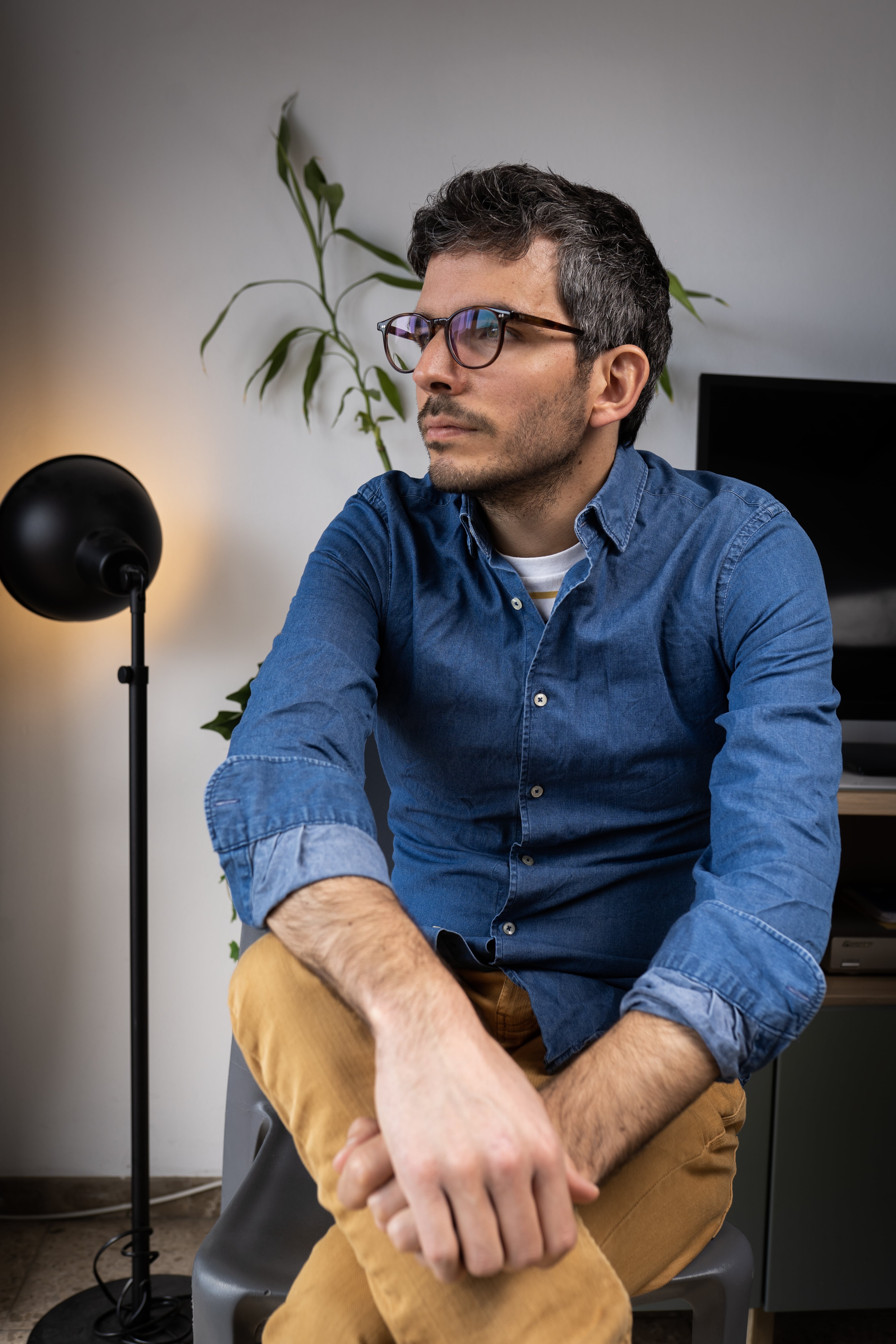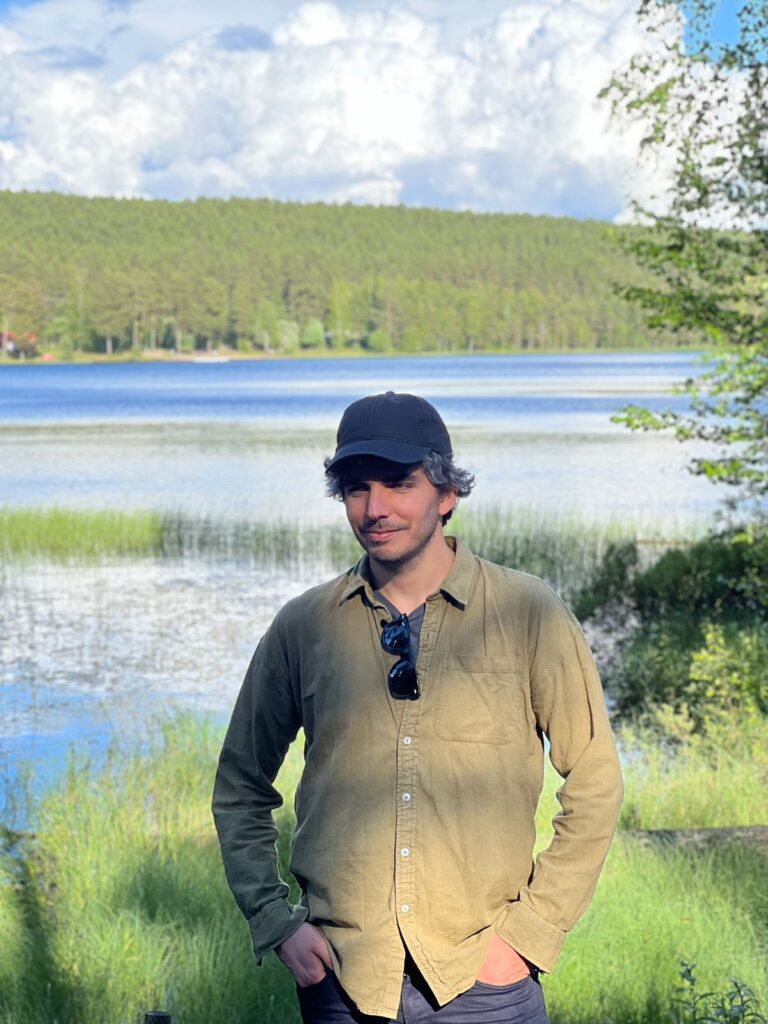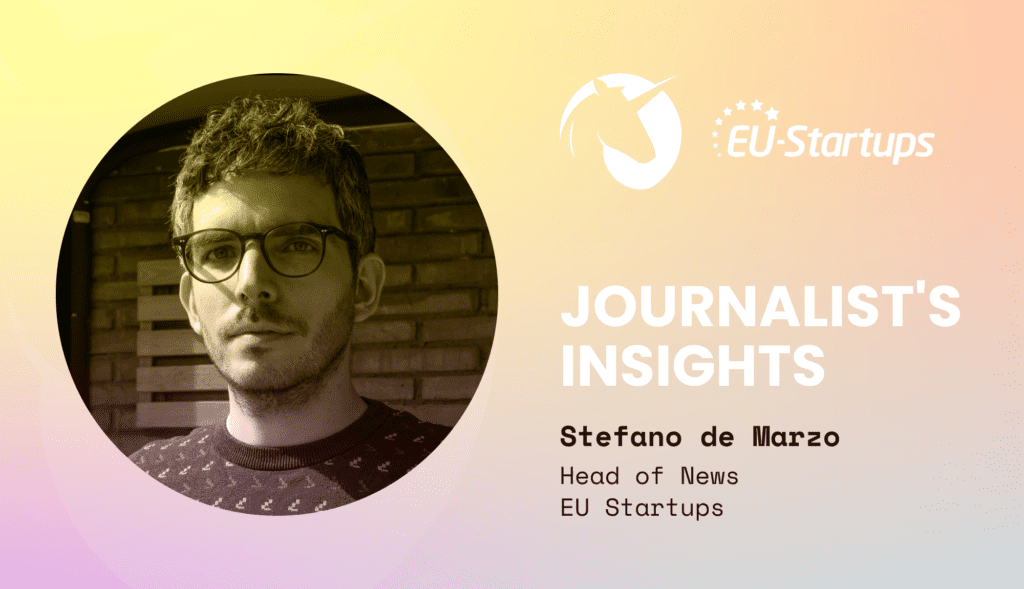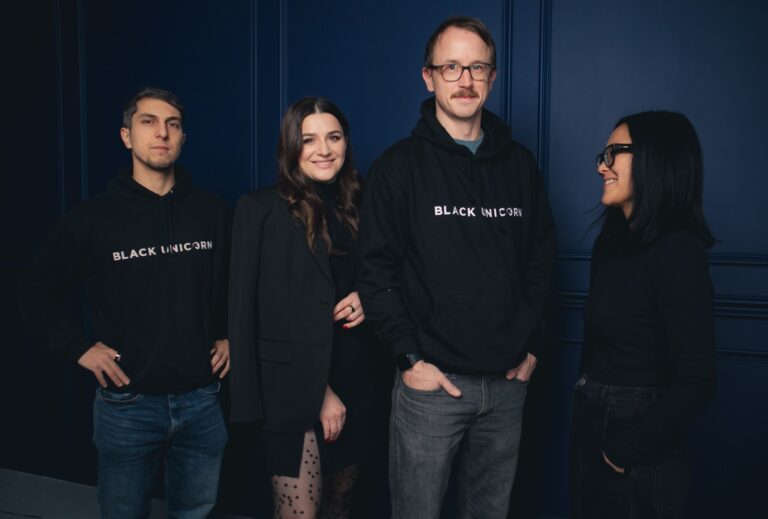The journalist insights took a bit of a break, but boy oh boy have we got a good one for you. We chatted with EU Startups‘ Stefano de Marzo. A while back he caught our attention on LinkedIn with a post on why (as a journalist in startup media) he doesn’t cover pizza trends. Stefano is EU Startup’s Head of News, so we knew he would be a prime candidate to deliver us with even more interesting insights and perhaps some controversial pet peeves, with inbox craziness and being the target of irrelevant pitches pretty much guaranteed.
First we dive into Stefano’s personal life. And he had a lot to share after living in various countries, and as an avid reader and consumer of culture. Of course there were also loads of nuggets on startup media/journalism, the life of a journalist and PR practices. You don’t want to miss his opinion on journalist pet peeves, the state of the press release’s utility and AI/ChatGPT. Finally, although we don’t recommend you add small talk to your email pitches, if you want to know what to talk with Stefano about read until the end!
OK, we’ll stop with all the teasing now and let you get on with reading the interview. S’il vous plaît!
About EU Startups and Stefano’s role
Where are you from and where are you based?
Stefano De Marzo: I was born and raised in Lima, Perú, and worked for many years as a journalist and editor for local business media. I was based in Barcelona for many years (where the entire EU-Startups team is based) until a year ago when I relocated to Aachen, Germany, due to my wife’s job. Nevertheless, for work and family reasons, I go very often to Barcelona. So you could say I’m between the two countries, speaking Spanish, English and up and coming German.
How did you end up living in Barcelona and how is Aachen treating you?
SDM: Before basing myself in Barcelona, I spent some time between Madrid and San Sebastian, in northern Spain. One thing led to another. Somehow it was in Barcelona where I built a community of friends, colleagues and family, that I’m happy to see when I’m in town.
Aachen is a more challenging environment, although the Rhein area in Germany is very beautiful (good beer too!). I really enjoy spending weekends in Cologne and crossing the border to spend time in Maastricht, a beautiful town in the Netherlands.
What are some of your favourite and less favourite things about Barcelona?
SDM: You can never be bored in Barcelona. Just hanging out on terraces with a drink and patatas bravas would be on top of my list. But the unbearable heat in the summer and the extremely crowded streets in certain parts of the city are not so nice. Mass tourism is not sustainable.
Favourite Barcelona spot?
SDM: I really miss my favourite coffee spots in El Born (like Caracas, where you can get coffee from anywhere in the world) and Gracia (Noa Noa, Syra, Salvatge). Highly recommend some cocktail bars: Marlowe, in El Born, where they prepare a fantastic Penicillin; and 14 de la Rosa, in Gracia.
I also miss bookstores like Finestres, Backstory (a new English bookstore in Eixample), La Central, and the second-hand shops in Passeig Sant Joan.
Don’t get me wrong, I’m also enjoying Germany for the time being.
What’s the path that brought you to the world of journalism?
SDM: Fun fact: I was pretty lost when I was trying to find a career path while finishing high school. My interests were very diverse, but at the heart of it was a passion for writing and reading. Lucky for me, editors liked my stuff from the beginning and I started getting commissions and slowly getting myself into newsrooms.
How did you actually end up joining EU Startups?
SDM: After contributing to several outlets like Sifted, Entrepreneur and Forbes about VC and startups in Spain and Latam, I met Thomas Ohr, the founder and director of EU-Startups. We sat for coffee and got along pretty quickly. My predecessor was leaving for a new job and he was looking for somebody to take over the news department in the outlet. The rest is history.
In 2024/2025, what is the big focus/objective for EU Startups?
SDM: Keep growing! We are a diverse team that works in different formats, including a super cool podcast. Our last summit in Malta was a complete success in a beautiful location. I’ve attended my fair share of startup events, and I have to say the EU-Startups one should be on your list if startups are your thing! We want to keep being the go-to outlet to be up to date with all things European startup ecosystem.
What does your role entail today?
SDM: As Head of News of EU-Startups, my job is to keep our audience up to date on the most important news happening in the European ecosystem. A big part of it is filtering and highlighting the most interesting funding rounds, acquisitions, as well as important regulatory changes having an impact on the ecosystem. We try to bring value and offer our vision of the ecosystem through these exciting stories.

Working in startup journalism and advice for PR pros
How is tech-startup journalism different from more ‘traditional’ business journalism?
Stefano De Marzo: I think business journalism is already a niche. In that sense, startup tech journalism is a niche of a niche. So it is very specific, a lot of jargon involved. If you are new to it is hard to identify when news is actually news. Startup culture is relatively new, 40 years maybe? So you need to know the foundational myths. I’m talking about, of course, the Magnificent 7 (Alphabet, Amazon, Apple, Meta, Microsoft, Nvidia and Tesla), but also the big VCs like Sequoia or a16z, just to mention a couple.
Europe has been catching up with Silicon Valley since the beginning of the 2000s. That Europe is more risk averse, is something that people repeat a lot. But every ecosystem is different, and every single one has its good and not-so-good things. So I would say startup journalism is about keeping up with the fast-paced rhythm of the tech world, and enjoying it in the process.
What things about startups make them newsworthy, in your opinion?
SDM: I really need to see why I’m receiving this pitch. A good hook from a decent outlet is always appreciated. Also, give me some background and explain, in your own words, why your story is important. Get out of your jargon and technicisms, and try to explain something in the simplest way possible.
A startup is news if it’s resolving a problem in a specific industry, if it has good backers, if it’s already showing traction and case studies, and if it’s coming from a specific ecosystem (the big ones or the under-the-radar ones). Make a case about your story. Pitch the media the same way you’ll pitch to Y Combinator (if you are a founder).
When you get pitched by a new startup – what hygiene elements do you look out for? How important is a polished founder profile on LinkedIn, Twitter, a good looking website, or previous press coverage?
SDM: All of the above. Not having those is a red flag for me. I’ve seen really badly presented stuff over the years. I know that it can be a lot of work to have everything in place. But please people, make an effort. Not only for the media. For your own good.
What does your day-to-day look like?
Stefano De Marzo: I wake up at 6am and go swimming for 45 minutes at my neighbourhood pool, at least three times per week. Before I start work, I read the news (not only tech and startup ones) with plenty of coffee. I would like to stress the fact that a journalist has to be an omnivorous reader. A journalist who covers tech and only reads about tech will always be an incomplete professional.
I like when I meet people (founders, investors, PR professionals, other journalists) who have a diverse set of interests, people who can speak about different topics, from science to sport, to politics, to art. In my free time, I mostly read novels, essays and poetry. I’m also a film geek, always nerding about classics, the new artsy film or the upcoming blockbusters.
I think storytelling is at the heart of what we do as journalists. If you don’t know how to consume and enjoy stories, how are you gonna tell a good one?
How busy is your inbox and how do you manage it?
SDM: It’s a big mess but I’ve gotten better at it. I wish there was a way to eliminate spammy emails at all. Sometimes I only read one word or two from the subject line. So definitely those two words are critical.
Is the press release dead? Would you prefer to receive information in a different way?
SDM: Nowhere near dead. I think it is still the best way to present information in a systematic and orderly way. I’ve seen different versions of it over the years. But I prefer a traditional one. It’s hard to beat the inverted pyramid value proposition.
What were the best pitches you ever got?
SDM: With the years you start trusting certain PR professionals, you get to know them, you believe in their work. What happens is that inevitably you take their pitches more seriously. You know they are good professionals, providing high-quality material and working with smart clients. I like it when a pitch makes me feel interested from the start, from the subject line to the hook to the last part of it.
What is your biggest pet peeve about PR practitioners or the PR industry?
Stefano De Marzo: Recently I found a very funny and insightful LinkedIn post by Allison Carter, Editor in Chief at PR Daily. I think she was spot-on on what a Monday morning can look like for journalists. That is plenty of spam and unrelated topics you don’t cover, and your occasional scammer.
I have to say, scammers are getting smarter and better by the second. PR people could learn from them. They can really catch your attention. Maybe scammers have an untapped opportunity in PR and they don’t know it yet.
In your experience, the best PR pros work in which ways?
SDM: The best PRs play a little bit hard to get. Are interesting and mysterious. They have a defined voice and a style. They learn about you before reaching out. You can even feel honoured to be reached out by them. Going back to a previous answer. I like it when PRs are smart and knowledgeable and can speak about a wide range of topics.
If you could change one thing about how PR and journalists communicate, what would it be?
SDM: I think journalists can be very unfair and rude to PR professionals. We are all trying to do our jobs here. Show some politeness, people. We can all have a bad day, but please always show good manners.
Also, journalists must be upfront, honest and genuine when they need something from PR professionals. They can be great allies when you need to find a good source. They can streamline and get info while you focus on something else. As I see it, it’s about efficiency. Of course, always do your due diligence on the info you are getting.
How do you see AI changing media in the next few years and what do you think media will look like in the medium/longer term future?
Stefano De Marzo: When ChatGPT came out I was in denial. I didn’t want to hear about it. After some months I tried it out and I was impressed. However, soon enough that excitement wore off. Back in those days, I came up with this theory that I shared with colleagues: AI will make human writing even more valuable. Crazy, because at first, everybody thought it was gonna replace writers and editors (probably it has to some extent).
But another consequence of this has been to realise how scarce good writing is. By now it’s easy to spot AI-generated content (even without the help of AI detectors). Something is missing there in those texts. In a way, writing has been commoditised by AI, and for that same reason, we can identify the good from the bad. I cannot help but think that AI writing is like those WordArt options from the 90s Microsoft Word.
I think media is slowly going back to basics, good reporting, good writing and, maybe, print.
Personal-ish questions
What stories do you enjoy writing about the most?
Stefano De Marzo: The ones that involve long reporting, multiple sources, and exploring new undiscovered trends. It is not something I do lately, because I’m caught in the everyday news madness. But something I wish to do more in the future.
What verticals, countries or things excite you most in the world of startups?
SDM: I think the world of impact investing needs to start showing more results. 7 or 8 years ago, investing in climate was new and exciting. Now it needs to fulfil its promises, and show the impact they are making.
I’m always curious about hardware. It doesn’t get a lot of press, as opposed to software. Also I’m interested in the infrastructure layer of technology. We are always caught in the application layer.
I always have an eye for what’s going on in Southern Europe (Spain, Portugal or under-the-radar ecosystems like Italy and Greece) and the Nordics.
If you were to found a startup, what issue would you look to tackle?
SDM: Media. We need more media. I’ve been passionate about exploring media business models since I started in journalism in the 2000s, back when social media hit the industry.
There are a lot of interesting examples, besides the NYT. Economic and business media has never died because it serves a purpose. That is investors and decision-making executives need to be on top of news and things happening to make decisions. But there are also brands like Monocle, and lately, Semafor, tapping on specific audience needs. 404 Media is another good case.
I feel that lately there has been a little bit of digital fatigue. I just heard somebody saying that at the beginning of the 2000s people were flocking to the internet, and now it’s the other way around. People are starting to get tired of everything digital. You see a resurgence in the sales of vinyls, books, and print magazines. No data collection in the analog economy. The Onion just announced they are back in print. Why? Its editor said that for the same reason that 18-year-old kids are buying Taylor Swift vinyls.

Food, travel and following Stefano
What does the future hold for Stefano?
Stefano De Marzo: I really love working as an editor and journalist. But, as I said before, it’s all about storytelling. Telling stories is my beat.
Favourite holiday type?
SDM: Always beach, although I’ve been enjoying the lakes in Germany and Sweden. Looking forward to exploring more of Norway.
Favourite cuisine?
SDM: Pizza! Different types of Asian food are also always on my favourite list. Of course, Peruvian food is always a must. That is something that I cannot get in Germany as easily. In Barcelona, I used to have a Peruvian place around the corner, which I try to visit every time I’m in town. When you go there, you really feel like you are in Peru.
Where might one find you on a weekend?
SDM: Slow mornings reading and listening to records at home.
Finally, how can we best follow your work?
Stefano De Marzo: LinkedIn. I’m thinking about creating a Threads account. There is something out of control about X since the Musk takeover. I’ve been trying to downsize my digital presence, but I believe LinkedIn is a good professional channel.
Enjoyed the interview with Stefano? Check out the rest of our blog and our Journalist’s Insights series:
Mad about startups with David Johnson of Maddyness UK
Ioanna Lykiardopoulou from The Next Web
Startups, the Media and CEE with Zosia Wanat from Sifted
Busting Journalism Myths with Lindsay Dodgson from Business Insider
Diving into fintech journalism with Doug Mackenzie from Fintech Finance
Securing media placements during COVID-19 with Yessi Bello-Perez from The Next Web
From PR to Media With Remco Janssen of Silicon Canals
The importance of regional media for startups, with Anda Asere from Labs of Latvia



